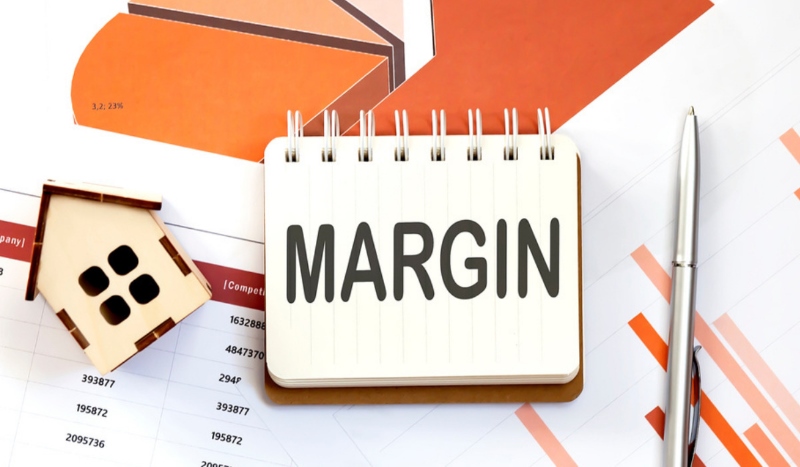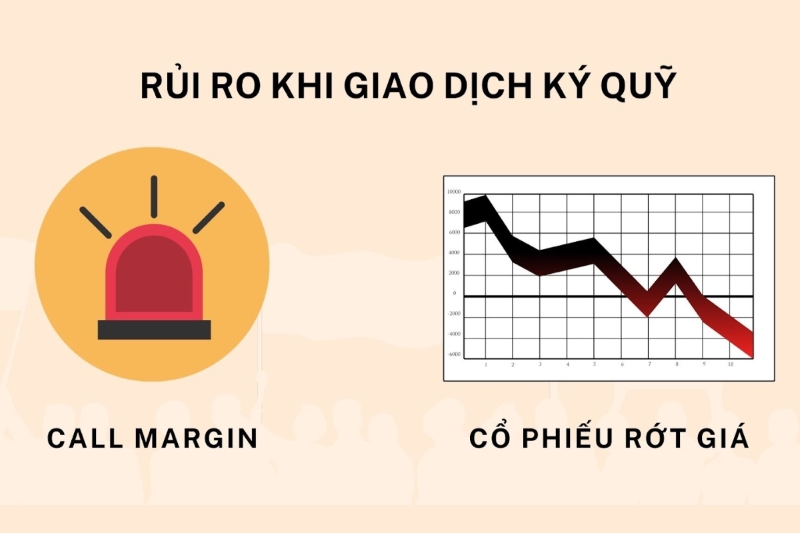What is securities margin? Margin is an important term in the field of securities investment, designed to support investors entering the investment market.
What is Securities Margin?
Securities margin can be understood as a form of capital loan provided by a securities company for investors to conduct securities trading transactions. Investors only need to use a part of their own capital as collateral (called the margin), the rest will be borrowed from the securities company. This not only helps to expand the scale of investment but also provides the opportunity to access larger investment portfolios, even when the initial capital is not enough.

Key Benefits of Securities Margin Trading
1. Expand Investment Scale
Margin allows investors to easily increase the number of securities they can buy, thanks to the use of borrowed capital. For example, if an investor has VND 100 million and the margin ratio is 50%, they can borrow an additional VND 100 million from a securities company to invest in a portfolio worth VND 200 million. This not only allows investors to allocate capital more flexibly, but also minimizes the risk when diversifying their investment portfolio. As a result, the impact of unsuccessful investments will be mitigated, helping to protect total investment assets.
2. Profit Optimization
Margin trading offers the opportunity to increase profits when the stock market is rising. By leveraging borrowed capital, profits can be multiplied significantly. For example, if an investor uses VND100 million of their own capital to buy 1,000 shares at VND100,000 per share and the share price increases to VND120,000, they will earn a profit of VND20 million. However, if the investor borrows an additional VND100 million to buy 2,000 shares, the profit can be up to VND40 million. However, this also comes with risks, because when the market falls, the investor's losses will also increase proportionally.
3. Flexibility in Capital Management
Another advantage of margin trading is the flexibility in managing assets and taking advantage of investment opportunities. Investors do not need to wait to accumulate enough capital, but can participate as soon as attractive opportunities appear in the market. This is especially important in the context of constantly fluctuating markets, when timing can be a decisive factor in success.
In addition, the funds from the deposit can be allocated to invest in other areas, such as real estate or investment funds, while maintaining current investments in stocks and bond funds. This not only helps investors diversify their investment portfolio but also optimizes overall returns. Furthermore, the flexible investment strategy allows the portfolio to be adjusted according to market developments and macroeconomic factors, protecting assets from unexpected risks.
What is a Margin Securities Account? Introduction and Features
A margin account is a special financial instrument provided by securities companies, allowing investors to use borrowed capital to conduct securities transactions. Instead of having to spend the entire amount to buy securities, investors only need to use a portion of their own capital as a margin, the rest will be lent by the securities company. This helps to expand investment capabilities and profit potential.

Securities Margin Account Opening Process
To start trading through a margin account, investors need to follow some basic steps:
1. Choose a Reliable Securities Company/Business
The first and most important step in opening a margin account is choosing a brokerage firm. Investors need to consider the following important factors when making a decision:
- Valid operating license: Choose a securities company with a license to operate from a state management agency, ensuring that the company operates legally and with prestige.
- Customer service quality: Evaluate the company's customer support capabilities, including quick response times and professionalism in consulting.
- Reasonable transaction fees: Consider the transaction fees of securities companies to choose the most economical and effective option.
- Trading Platform: The online trading platform must be easy to use, stable and provide all the necessary tools for investors.
2. Complete the Account Registration Form
After choosing a brokerage firm, the next step is to fill out an application to open a margin account. The information required in the application includes:
- Personal information: Including full name, date of birth, ID card number/CCCD number, address, phone number and email.
- Financial information: Investors need to provide details about current income, occupation and personal financial status.
- Investment purpose: Investors also need to share their investment reasons and goals, as well as previous investment experience if any.
3. Signing the Account Opening Agreement
After completing the application, the investor will sign a margin account opening contract with the securities company. This contract will clearly state the conditions for using the account, including:
- Required margin ratio: The minimum ratio that an investor must maintain in the margin account when making transactions.
- Loan conditions: Regulations on conditions and procedures for borrowing money from securities companies.
- Risk and liability: Refers to the risks of using margin and the responsibilities of the parties in the transaction process.
4. Deposit Funds Into Your Margin Account
After completing the registration procedures and signing the contract, the investor needs to deposit money into the margin account to start trading. This deposit amount is usually a certain percentage of the value of the securities you want to buy. Commonly used deposit methods include:
- Bank transfer: You can transfer funds directly from your bank account to your escrow account.
- Cash deposit: Some securities companies support cash deposits at transaction offices.
- Use e-wallet: If the securities company allows, you can deposit money through e-wallets that support online payments.
Important Notes When Opening a Margin Account
Although margin accounts offer many attractive investment opportunities, investors should also be aware of the potential risks. Borrowing money to invest can expose investors to greater risks, especially when the stock market is volatile. Therefore, before signing a contract and starting to use a margin account, investors should carefully read the terms of the contract and understand the commitments they must fulfill.

Margin in Securities
Margin in securities It is not just about borrowing money, but also about regulations and risks. Investors need to understand the margin ratio, which is usually calculated based on the value of the securities they want to buy.
Margin Ratio
Margin rates typically range from 30% to 50%, depending on the type of securities and the regulations of each securities company. This means that investors need to have at least 30% worth of securities in their accounts.
Risks When Depositing
Margin trading offers many attractive investment opportunities, but it also carries some significant risks that investors need to be aware of. Here are two main risks when engaging in margin trading:

1. Risk of Loss
One of the biggest risks of using margin is the possibility of loss. When investors borrow money to buy stocks, they are betting that the stock price will rise. However, if the stock price falls, the investor will suffer losses not only from their own capital but also from the loan.
For example, if an investor has VND100 million and deposits another VND100 million, the total investment value will be VND200 million. If the stock price drops by 30%, the portfolio value will be only VND140 million. In this case, the investor will not only lose VND60 million from the investment capital but also have to pay interest on the loan. This can lead to a large loss, seriously affecting the investor's personal financial situation.
2. Additional Margin Request
The second risk associated with margin is the requirement for additional margin. Brokerage firms often have regulations on the minimum margin ratio that investors must maintain in their accounts. When the value of the assets in the account falls below the required level, the brokerage firm may require the investor to deposit more money into the account to compensate for this decrease.
This can happen in situations of strong market volatility. If the investor is unable to deposit additional funds as requested, the brokerage firm has the right to sell some or all of the securities in the account to reduce the risk to the lender. This not only reduces the investment ability but can also lead to the investor having to accept unexpected losses.
Derivative Securities Deposit
Derivative securities margin is a form of margin applied to derivative products, such as futures or options. It has distinct characteristics compared to traditional securities margin.
Features of Derivative Securities Margin
- Lower Margin Rate: Usually has lower margin rates than regular stock margin.
- Short Transaction Time: Derivative products often have short-term trading periods, requiring high sensitivity.
What Are Non-Margin Securities?
Some securities cannot be traded on margin, meaning investors cannot borrow money to buy them. Common types of these securities include:
- Illiquid Securities: Securities that are rarely traded or have low trading volume.
- High Risk Securities: Securities with high volatility are generally not allowed to be traded on margin.
Why Not Margin Trading?
The main reason is to protect investors from unnecessary risks. If a security is high risk, lending money to invest can lead to large losses.
Conclude
Margin trading is a useful tool for investors who want to maximize their profits from stock trading. However, using margin also comes with many risks that investors need to consider. HVA Hope this article has helped you understand more about What is securities margin? and related aspects. Always be cautious and well informed before deciding to invest!











